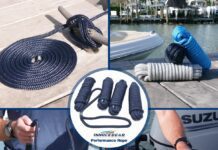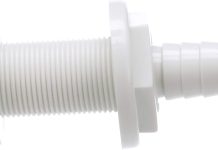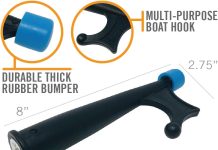Have you ever driven past a luxurious waterfront property and wondered, “Where do rich people keep their boats?” It’s an intriguing question, as we often imagine these opulent vessels hidden away in some secluded paradise. In this article, we will explore the exclusive harbors and marinas that cater to the wealthy, providing them with a home for their beloved boats that matches their lavish lifestyles. Prepare to set sail on a journey into the glamorous world of where the rich keep their prized possessions.
This image is property of qph.cf2.quoracdn.net.
Boat Storage Options for the Wealthy
Boats are not only a means of transportation or a hobby for the wealthy, but also a symbol of their status and wealth. As we delve into the world of the wealthy boat owners, we uncover the various boat storage options available to them. From private marinas to storage on private islands, there are numerous choices to cater to every need and desire.
Private Marinas
Private marinas offer an exclusive and luxurious option for boat storage. These marinas are typically located in prime waterfront locations and provide a host of amenities and services tailored to the needs of the wealthy. Owners can enjoy the convenience of having their boat readily accessible and the peace of mind that comes with state-of-the-art security measures.
Yacht Clubs
For those who seek a sense of community and camaraderie, yacht clubs provide an ideal boat storage option. Yacht clubs offer membership opportunities and access to a range of facilities and amenities. Besides storage, yacht clubs often provide maintenance and repair services, as well as opportunities for socializing and networking with fellow boat enthusiasts.
Private Docks
For those lucky enough to have waterfront property, private docks offer the ultimate convenience in boat storage. Building a private dock allows owners to have their boat right at their doorstep, ready for spontaneous outings on the water. However, owning a private dock comes with certain responsibilities, such as obtaining permits and adhering to regulations, as well as taking on maintenance responsibilities.
Home Ports
Home ports are designated areas on residential waterfront properties where boat owners can securely store their vessels. These designated parking areas often come equipped with dock and lift systems, providing easy access to the water. Home ports also offer additional facilities and amenities, making them a popular choice for wealthy boat owners seeking convenience and comfort.
Boat Houses
With their unique design and functionality, boat houses are an intriguing option for boat storage. These structures combine elements of a traditional house and a boat storage facility, providing both protection from the elements and easy access to the water. Boat houses also offer additional space for storing equipment and amenities for the owners’ comfort.
Boat Sheds
Boat sheds provide a more practical and straightforward approach to boat storage. These structures are typically standalone buildings or shelters that offer protection from the elements while keeping the boat easily accessible. Boat sheds come in various sizes and can be owned or leased, offering flexibility to accommodate different boat sizes and storage needs.
Luxury Boat Storage Facilities
For those who desire the utmost in luxury and convenience, exclusive boat storage facilities cater specifically to the needs of wealthy boat owners. These facilities offer valet and concierge services, ensuring a seamless experience from drop-off to pick-up. They also prioritize security and privacy, employing advanced measures to safeguard valuable vessels. Furthermore, these facilities often provide climate-controlled environments to protect boats from extreme weather conditions.
Superyacht Berths
Superyacht berths are a breed of boat storage facilities designed specifically for superyachts, luxurious and often massive vessels. These berths offer the necessary infrastructure and facilities to accommodate these impressive boats, including advanced security systems, maintenance and support services, and transportation and access options appropriate for their size and grandeur.
Boat Storage in Exclusive Resorts
Some wealthy boat owners prefer to store their boats in exclusive resorts that offer private docking facilities. These resorts often have their own marinas or private docks, providing the convenience of having the boat close by while also offering access to a range of luxury amenities and services. This option allows boat owners to combine their boating lifestyle with the luxury and relaxation of a high-end resort.
Storage on Private Islands
For the truly extravagant, storing boats on private islands adds an extra level of exclusivity. Private islands provide a secluded and secure environment, ensuring ultimate privacy and security for valuable vessels. With their own infrastructure and facilities, including transportation options, maintenance and support services, private islands offer a delightful and exclusive setting for boat storage.
Factors Influencing Boat Storage Choices
In the world of boat storage, there are several factors that influence the choices made by wealthy boat owners. Understanding these factors can help shed light on why certain storage options are preferred over others.
Proximity to Residence
One of the primary considerations for boat owners is the proximity of the storage facility to their residence. Being able to easily access their boat without an extensive commute is essential for spontaneous outings and quick getaways on the water.
Security and Privacy
Wealthy boat owners often prioritize security and privacy when choosing a storage option for their vessels. Advanced security measures, such as surveillance systems, access controls, and 24/7 monitoring, provide peace of mind, while privacy ensures their boats remain hidden from prying eyes.
Availability of Services
Having access to comprehensive services, including maintenance, repairs, fueling, and cleaning, is crucial for keeping boats in top condition. Storage options that provide on-site services cater to the needs of wealthy boat owners who value convenience and professional care for their prized possessions.
Maintenance and Repair Facilities
The availability of maintenance and repair facilities is an essential consideration for boat owners. Storage options that offer these services on-site or have partnerships with reputable service providers can help reduce the hassle and inconvenience of arranging repairs and maintenance.
Boat Size and Type
The size and type of the boat play a significant role in determining the suitable storage option. Larger yachts and superyachts require specialized facilities with adequate space and infrastructure to accommodate their unique needs.
Frequency of Use
Some boat owners use their vessels frequently, while others enjoy them on a more sporadic basis. Storage options that offer easy and quick access to the water are preferred by those who use their boats regularly, while others may prioritize security and long-term storage for boats that are used infrequently.
Cost and Affordability
While cost may not be a significant concern for wealthy boat owners, it still influences their choices. The cost of storage, maintenance, and additional services is taken into account when selecting the best storage option that aligns with their financial means.
Resale Value Considerations
Boat owners who anticipate selling their vessels in the future are likely to consider how different storage options can affect their boats’ resale value. Storage facilities that offer optimal conditions, including protection from the elements and proper maintenance, can help preserve the boat’s value over time.
Travel and Exploration Opportunities
Some boat owners enjoy traveling and exploring different waters. Storage options that provide easy access to various locations and waterways expand the horizons for these adventurous enthusiasts.
Climate and Weather Conditions
Considering the climate and weather conditions of the storage location is crucial for boat owners. Boats need to be protected from extreme weather elements like heat, cold, and storms. Storage options that offer climate-controlled environments or have adequate protection against the elements are highly sought-after by boat owners.
Private Marinas
Definition and Features
Private marinas are exclusive docking facilities that cater to the needs of wealthy boat owners. These marinas are privately owned and offer a range of features and amenities to provide an exceptional boating experience.
Location and Accessibility
Private marinas are strategically located in prime waterfront areas, offering scenic views and convenient access to the water. The locations are carefully chosen to provide easy reach to popular boating destinations and ensure a pleasurable cruising experience.
Ownership and Fees
Private marinas are privately owned and operated, often by companies or individuals targeting an affluent market. The owners charge fees for renting dock space or slips, which can vary depending on factors such as location, size of the boat, and additional services provided.
Amenities Offered
Private marinas go above and beyond basic docking facilities to provide an array of amenities for boat owners. These can include fueling stations, boat cleaning and maintenance services, electricity hookups, sewage pump-out services, laundry facilities, and restaurants or lounges for recreation and socializing.
Security Measures
Private marinas prioritize the security of the boats stored within their premises. They employ advanced security measures such as surveillance cameras, access control systems, and 24/7 security personnel to ensure the safety of the vessels and prevent unauthorized access.
Additional Services
In addition to basic amenities, some private marinas offer additional services tailored to the needs of their wealthy clientele. These can include concierge services, yacht brokerage services, provisions for charters and boat rentals, and access to exclusive events and social gatherings.
Yacht Clubs
What Are Yacht Clubs
Yacht clubs are exclusive social institutions that bring together boat owners with a shared passion for boating and the sea. These clubs offer a range of facilities and amenities, creating a community where members can enjoy their boating lifestyle while fostering connections with like-minded individuals.
Membership and Admission
Yacht clubs typically require potential members to submit an application, often subject to approval by a committee. Admission criteria may vary, but they generally focus on the applicant’s boating experience, references from existing members, and a demonstrated commitment to the values and traditions of the club.
Facilities and Amenities
Yacht clubs provide a host of facilities and amenities aimed at enhancing the boating experience of their members. These can include secure and well-maintained dock space or slips, fueling stations, maintenance and repair facilities, clubhouse with dining options, swimming pools, tennis courts, and gyms.
Social and Networking Opportunities
One of the primary attractions of yacht clubs is the opportunity to socialize and network with other boat owners who share a passion for boating. Yacht clubs often host social events, regattas, and races, creating a friendly and engaging atmosphere where members can develop lasting friendships and connections.
Maintenance and Repair Services
Yacht clubs understand that boating requires regular maintenance and repairs. To cater to this need, many clubs offer on-site maintenance and repair services or have partnerships with trusted service providers. This ensures that boat owners have easy access to professional support to keep their vessels in optimal condition.
This image is property of api.time.com.
Private Docks
Building and Ownership
Private docks are constructed by boat owners who have waterfront property and wish to have their own docking facility. Building a private dock involves obtaining permits and adhering to regulations set by local authorities to ensure safety and environmental compliance.
Advantages and Disadvantages
Owning a private dock offers several advantages. Boat owners have immediate access to their vessels, eliminating the need for commute or arrangement with external storage facilities. Private docks also ensure privacy and exclusivity, as only the owners and their invited guests can access the dock. However, the construction and maintenance of a private dock can be costly and time-consuming.
Permits and Regulations
Before constructing a private dock, boat owners must obtain permits from the relevant authorities. These permits ensure compliance with safety and environmental regulations and may specify requirements such as maximum size, construction materials, and setback distances from property lines or waterways.
Maintenance Responsibilities
Owning a private dock comes with maintenance responsibilities. Regular inspections, cleaning, and repairs are necessary to ensure the dock’s safety and structural integrity. Boat owners must also take into account ongoing maintenance costs and considerations for weather and environmental conditions specific to their location.
Customization Options
Building a private dock provides boat owners with the opportunity to customize the facility to their specific needs and preferences. They can choose the size, design, and additional features such as boat lifts, electricity hookups, storage lockers, or seating areas. Customization allows for a personalized and tailored experience.
Home Ports
Definition and Purpose
Home ports refer to designated boat parking areas on residential waterfront properties. These areas are intended to provide a convenient and secure location for boat owners to store their vessels close to their homes.
Residential Waterfront Properties
Home ports are typically found in residential areas with access to a body of water. Boat owners who own or have access to waterfront properties can create a home port by designating an area on their property for boat storage and docking.
Designated Boat Parking Areas
Home ports often have designated areas such as boat lifts, docks, or slips where owners can securely park their vessels. These areas are designed to provide easy access to the water while ensuring the safety and protection of the boat.
Dock and Lift Systems
To facilitate easy boat access and retrieval, home ports may have dock and lift systems installed. These systems eliminate the need for boat owners to manually launch or retrieve their vessels, making boating more convenient and time-efficient.
Facilities and Amenities
Home ports sometimes offer additional facilities or amenities for the comfort and convenience of boat owners. These can include storage lockers, electricity hookups, fueling stations, water supply, and even recreational areas such as swimming pools or barbeque pits.
Maintenance and Security Considerations
Home port owners must consider maintenance and security measures to ensure the longevity and protection of their boats. Regular maintenance, including cleaning, checking for damage or wear, and addressing any repair needs, helps preserve the boat’s condition. Security measures such as surveillance cameras, access controls, and proper lighting can deter theft or unauthorized access.
This image is property of nypost.com.
Boat Houses
What Are Boat Houses
Boat houses are structures specifically designed to provide shelter and protection for boats. These buildings combine elements of traditional houses and boat storage facilities, offering a unique and practical solution for boat owners.
Construction and Design
Boat houses are typically constructed with durability and functionality in mind. They are designed to withstand weather elements and provide adequate space for boat storage. Boat houses often feature large doors or openings that allow easy boat access and can be operated manually or automatically.
Benefits and Drawbacks
Boat houses offer several benefits to boat owners. The primary advantage is protection from the elements, including sun, rain, snow, and wind, which can cause damage to boats. Additionally, boat houses provide privacy and security, as the boat remains hidden from view. However, boat houses can be expensive to build or purchase, and they require sufficient land space for construction.
Protection from Elements
One of the main reasons boat owners opt for a boat house is to protect their vessels from the damaging effects of weather elements. The roof and walls of the boat house shield the boat from UV rays, rain, hail, and extreme temperatures, preventing deterioration and reducing the need for constant maintenance and repairs.
Facilities and Space Considerations
Boat houses often provide additional space for boat owners to store equipment and personal belongings related to boating. This can include storage racks, workbenches, or shelving units. The inclusion of these facilities makes boat houses more than just a storage solution; they become functional spaces for boat owners to work on their boats or store other watercraft.
Maintenance and Insurance
Boat houses require regular maintenance to ensure their structural integrity and protect the boats stored within. Regular inspections, cleaning, and repairs are necessary to address any issues promptly. Additionally, boat owners should consider appropriate insurance coverage for their boat house and the vessels stored within to safeguard against any unforeseen events.
Boat Sheds
Definition and Function
Boat sheds are purpose-built structures or shelters that offer protection and storage space for boats. These sheds range in size and design, catering to different boat sizes and storage needs.
Types of Boat Sheds
Boat sheds come in various types, including open-sided sheds, fully enclosed sheds, or hybrid designs that combine aspects of both. Open-sided sheds provide basic protection from the elements while allowing for easy access. Fully enclosed sheds offer maximum protection from weather conditions and potential theft. Hybrid designs strike a balance, offering flexibility and functionality.
Ownership and Leasing
Boat sheds can be owned, leased, or rented by boat owners. Owning a boat shed provides long-term stability and the freedom to customize the shed according to personal preferences. Leasing or renting a boat shed offers flexibility and convenience, especially for those who do not wish to commit to a permanent storage solution.
Location and Accessibility
The location of a boat shed is a crucial factor for boat owners. The shed should ideally be located near the water, allowing for easy transportation of the boat between the shed and the launching area. Accessibility considerations, such as road access and distance from the owner’s residence, also play a role in choosing a suitable boat shed.
Size and Capacity
Boat sheds come in various sizes to accommodate different boat sizes and types. From small sheds for personal watercraft to larger sheds for sizable vessels, boat owners can find a shed that fits their specific needs. Capacity is also an important consideration, as boat owners may own multiple boats or wish to have additional space for equipment storage.
Facilities and Maintenance
While the primary function of boat sheds is storage, some sheds may offer additional facilities for the convenience of boat owners. These can include electricity hookups, water supply, lighting, and even workbenches for maintenance tasks. Regular maintenance of the boat shed, including inspections, cleaning, and repairs, is necessary to ensure the shed’s structural integrity and the boat’s protection.
This image is property of qph.cf2.quoracdn.net.
Luxury Boat Storage Facilities
Exclusive Storage Facilities
Luxury boat storage facilities are designed to cater specifically to the needs of wealthy boat owners. These exclusive facilities go beyond traditional storage options, providing a range of services and amenities for a seamless and luxurious boating experience.
Valet and Concierge Services
Luxury boat storage facilities often offer valet and concierge services to streamline the boat storage process and cater to the individual needs of boat owners. Valet services handle the drop-off and retrieval of boats, saving owners valuable time and effort. Concierge services assist with arranging maintenance and repairs, fueling, cleaning, and other related tasks.
Security and Privacy
Security and privacy are top priorities for luxury boat storage facilities. These facilities employ advanced security systems, such as surveillance cameras, access controls, and on-site security personnel, to ensure the safety of the boats stored within. Privacy measures, such as restricted access and confidentiality agreements, ensure the utmost discretion for wealthy boat owners.
Climate-Controlled Environments
To protect boats from extreme weather conditions, luxury storage facilities often provide climate-controlled environments. Temperature, humidity, and ventilation are carefully regulated to create optimal conditions for boat storage, preventing damage from heat, cold, and moisture.
Maintenance and Repair Services
Luxury storage facilities understand the importance of top-notch maintenance and repair services for high-end boats. These facilities employ knowledgeable staff or partner with reputable service providers to provide professional care for the boats, including regular maintenance, repairs, and detailing.
Storage on Private Islands
Why Store Boats on Private Islands
Storing boats on private islands adds an extra element of exclusivity and luxury for wealthy boat owners. The seclusion and privacy that private islands offer, coupled with their natural beauty and serene surroundings, make them an attractive choice for storing valuable vessels.
Ownership of Private Islands
To store boats on private islands, boat owners need to either own a private island or have access to one through partnership arrangements or exclusive club memberships. Owning a private island allows boat owners complete control and discretion over their stored boats, fostering a sense of ownership and exclusivity.
Exclusive Privacy and Security
Private islands offer an unparalleled level of privacy and security for boat storage. Access to the island can be strictly controlled, ensuring that only authorized individuals can enter and approach the stored boats. This level of seclusion provides boat owners with peace of mind that their vessels are well-protected and hidden from public scrutiny.
Infrastructure and Facilities
Private islands used for boat storage typically offer the necessary infrastructure and facilities to support the boating lifestyle. This can include docking facilities or marinas, maintenance and repair services, fueling stations, and even luxurious amenities such as beach clubs, spas, and restaurants.
Transportation and Access
The transportation and access options to private islands for boat owners are specific to each location. It can involve private boat transportation, helicopter transfers, or even seaplane landings, depending on the island’s remoteness and infrastructure. Boat owners should consider these aspects when choosing a private island for their boat storage needs.
Maintenance and Support Services
Maintaining boats stored on private islands requires careful consideration. Private islands often have their own maintenance and support services or have partnerships with trusted service providers. This ensures that boat owners have access to professional support, including regular maintenance, repairs, cleaning, and provisioning, to keep their vessels in top condition.
This image is property of i.insider.com.






































